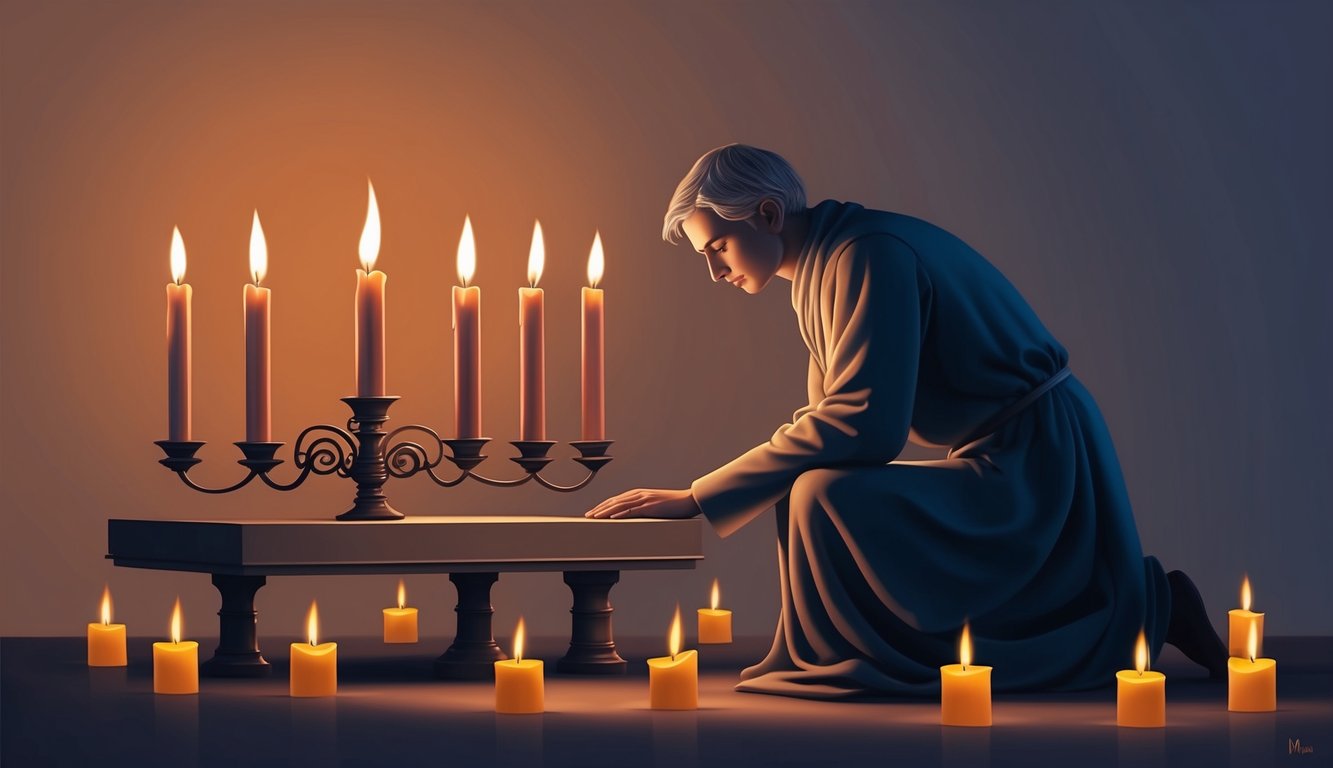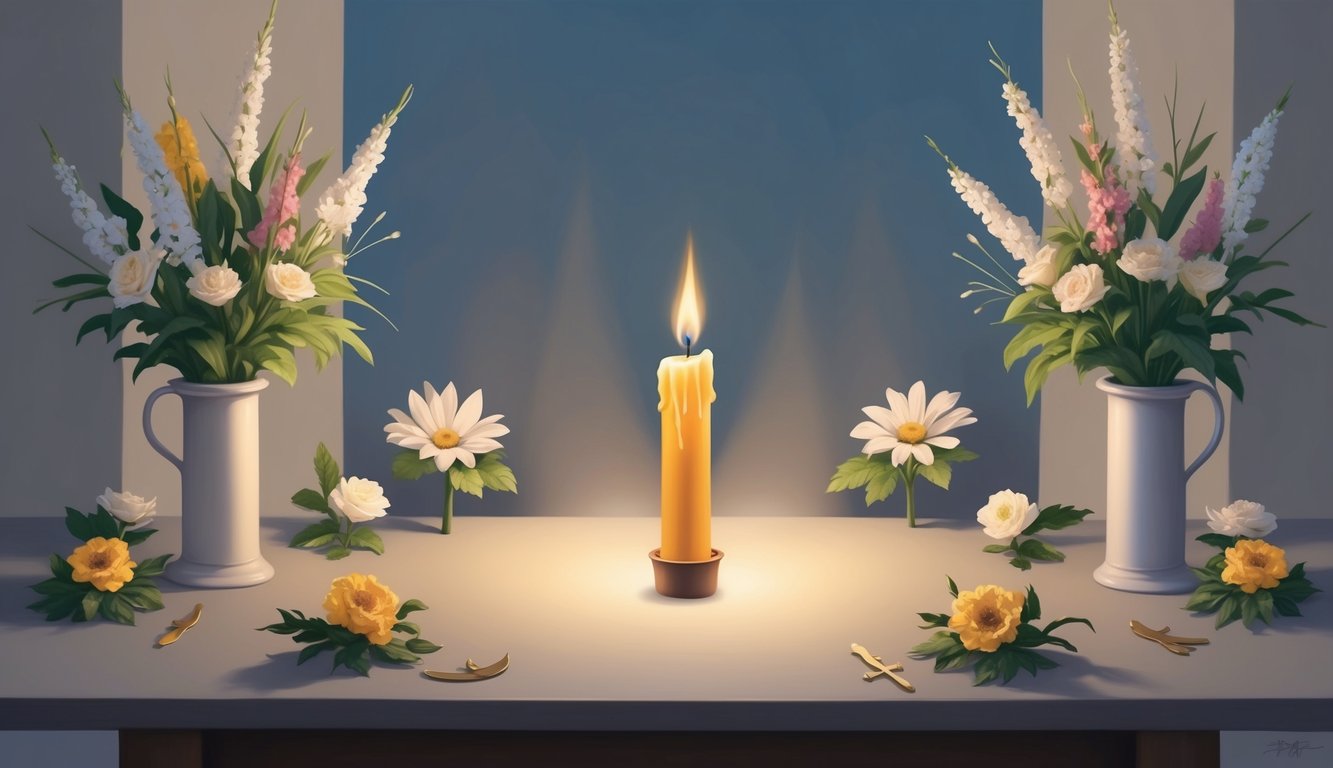Don’t Miss Out On This Unique Astrological Opportunity
Are you tired of spinning your wheels and getting nowhere? Simply put, you’re out of sync: you’re out of alignment with your astral configuration.
But: there’s a kind of map that can help you reclaim your alignment. Think of it as your own personal blueprint to success and happiness: a blueprint that will help you live your most amazing life.
Get started here.
Exploring the traditions of Christianity can be a beautiful journey, filled with rituals that bring comfort and hope. Novena for the dead is a special prayer practice in Christianity, often used to offer support to the souls of the departed. This tradition helps you connect with loved ones who have passed on while seeking peace for their souls.
During a novena, you’ll find yourself engaging in nine days of prayer, often with family and friends.
It’s not just about the repetition of prayers but about creating a space for reflection and remembrance.
As you gather together, the sense of community can be very comforting.
The origins of these rituals draw from longstanding Christian customs.
For many, participating in a novena for the dead offers healing by addressing feelings of loss while hoping for the eternal rest of those who have passed.
This practice not only honors them but also strengthens your faith.
Understanding Novenas for the Dead
Novenas for the Dead hold deep significance in the Catholic tradition.
They involve a series of prayers for the souls of the faithful departed, seeking the intercession of saints.
The Tradition and Significance
The novena is a traditional Catholic practice that involves praying for nine consecutive days.
It is often performed after the death of a loved one, as it is believed to aid the soul’s journey to heaven.
The number nine is symbolic of the time the apostles and the Virgin Mary spent in prayer between the Ascension of Jesus and Pentecost.
Novenas for the Dead often include prayers and reflections that focus on God’s mercy and eternal rest for the departed.
They are an important spiritual practice that provides comfort and support to mourners.
A study highlights how common it is for communities to gather in prayer for a novena or rosary after someone passes away, emphasizing its widespread cultural significance.
The Role of Saints
In Catholic novenas, the intercession of saints plays a crucial role.
Believers often seek the aid of specific saints whose lives relate to themes of redemption and compassion.
Saints are seen as intercessors who can present prayers to God on behalf of the living and the dead, bringing about spiritual benefits or aid.
Prayers during a novena may invoke saints to provide hope and guidance.
For example, when asking for mercy for the departed, the faithful might turn to a saint renowned for their compassion.
These requests highlight the deep trust in the power of saintly intercession and the strong community bonds through shared faith and practice.
Preparing for the Novena
When preparing for a novena for the dead, it is important to focus on setting intentions and understanding the value of repentance and mercy.
These aspects help in creating a meaningful atmosphere for prayer aimed at seeking peace for the deceased.
Setting Intentions
Setting intentions for the novena involves being clear about your prayers and what you hope to achieve.
This could include asking for peace for the departed soul or strength for those left behind.
Intentions guide your prayers and help in maintaining focus.
Consider writing down your intentions.
This can make your prayers feel more directed.
You might also want to involve family members in this process.
Sharing intentions can create a community feeling and deepen the prayer experience.
Setting intentions isn’t just about your personal goals.
It is also a time to reflect on the life of the deceased and what they meant to you.
Include prayers for forgiveness and acceptance, aligning with your understanding of faith and spirituality.
The Importance of Repentance and Mercy
Repentance and mercy are crucial aspects of the novena, helping both the living and the deceased find peace.
Repentance involves acknowledging past wrongs and seeking forgiveness through prayer.
Mercy, on the other hand, focuses on showing compassion and understanding.
Praying for mercy means hoping that the deceased are shown kindness in the afterlife.
It aligns with the Christian belief in God’s infinite compassion.
During the novena, emphasize prayers that include forgiveness and reconciliation.
This practice is believed to help in cleansing the soul and opening the path to eternal rest for the departed.
Reflecting on mercy and repentance can also bring a sense of peace and closure to those who are praying.
By fostering a spirit of compassion and understanding, the novena for peace encourages individuals to let go of past grievances and embrace healing.
This collective act of devotion not only benefits the departed but also strengthens the faith of those who participate.
Through sincere prayers and reflection, the novena for peace becomes a source of comfort and spiritual renewal for all.
Daily Prayer Structure

When practicing a novena for the dead, each day’s prayer carries unique components, often incorporating both rosary rituals and heartfelt supplications.
These elements serve as a guide to help you deepen your daily prayer life.
Components of Each Day’s Prayer
Each day’s novena prayer involves a structured approach.
Typically, you start with a specific intention or theme that’s meant to guide your thoughts and emotions.
You’re encouraged to focus on praying for the souls of the deceased, reflecting on their lives and your memories with them.
Scripture readings often serve as the core of daily prayers.
These readings help you draw inspiration and strength from the Bible and emphasize Christian values like faith, hope, and love.
Additionally, prayers specifically dedicated to easing the departed’s journey to eternal rest may also be included.
Repetition of short, meaningful prayers, sometimes called “ejaculatory prayers,” allows for personal reflection and meditation.
You can also include hymns or songs that carry special significance, further enriching your spiritual experience.
Incorporating Rosary and Supplications
The rosary plays a vital role in novena prayers.
You may incorporate different mysteries of the rosary across the nine days, which aligns with the traditional practice of meditative prayer in Christianity.
The repetition of the rosary serves to deepen your engagement and provides a sense of rhythm to each session.
Supplications are personal prayers where you express specific hopes, fears, or wishes.
These are important as they allow room for spontaneous, heartfelt petitions.
During these moments, you can voice concerns for the departed and seek peace and comfort for your loved ones.
This combination of ritual and personal prayer creates a profound spiritual journey.
Intercession and Hope

In the Christian faith, intercession plays a vital role in seeking divine help and guidance.
Turning to figures like St. Joseph and the Blessed Virgin Mary offers believers a sense of hope and support.
Calling on St. Joseph and the Blessed Virgin Mary
You can turn to St. Joseph and the Blessed Virgin Mary for help in times of need. St. Joseph is known for his role as the earthly father of Jesus and a protector.
Many believe he offers guidance and support, especially for families and workers.
The Blessed Virgin Mary is another important figure you might call upon.
Known as the Mother of Jesus, she is often seen as a compassionate and caring intercessor.
Christians around the world pray for her intercession, hoping she will bring their prayers to her son, Jesus.
Praying for Eternal Rest and Peace
When you pray for eternal rest, you ask for the souls of the deceased to find peace.
This includes offering prayers and masses for those who have passed away.
It’s a practice that gives hope to the living, believing their loved ones are at peace.
The intercession of St. Joseph, along with prayers to the Blessed Virgin Mary, can be crucial here.
They are believed to aid in delivering these prayers to God, offering comfort to those who wish for their loved ones’ peaceful rest.
The Closing of the Novena

In the closing of the Novena for the Dead, you focus on themes of love, compassion, hope, and renewal.
This time encourages looking back with tenderness and forward with faith in resurrection and eternal glory.
Reflecting on Love and Compassion
As you reach the end of the novena, it is a moment for deep reflection on the love shared with those who have passed.
This love does not fade; instead, it grows as you remember the bonds and memories that hold families together.
Compassion plays a crucial role as you pray for the souls of the deceased, wishing them peace and rest.
Prayers for the dead extend beyond simple rituals.
They embody hope and care, asking God to embrace the departed with mercy and forgiveness.
It’s a time to share stories, recount joyful moments, and express gratitude for the life and lessons left behind. Mourning is softened by the comfort of faith and community, as everyone gathers to honor the loved ones who have passed on.
Looking Forward to Resurrection and Glory
The closing of the novena also invites you to focus on the belief in resurrection and eternal glory.
Within Christian faith, death is not an end but a transition to a promised new life.
By engaging in these prayers, you renew hope in the resurrection, which gives meaning to earthly struggles and losses.
The teachings of Christ provide reassurance that life continues in another form.
As you pray, you look forward to a future where you and your loved ones are in communion with God.
This hope helps you find strength, reducing fear and despair.
By holding onto the promises of eternal life, you embrace a deeper sense of peace and steadfast joy in the promise of reunion and eternal glory.



